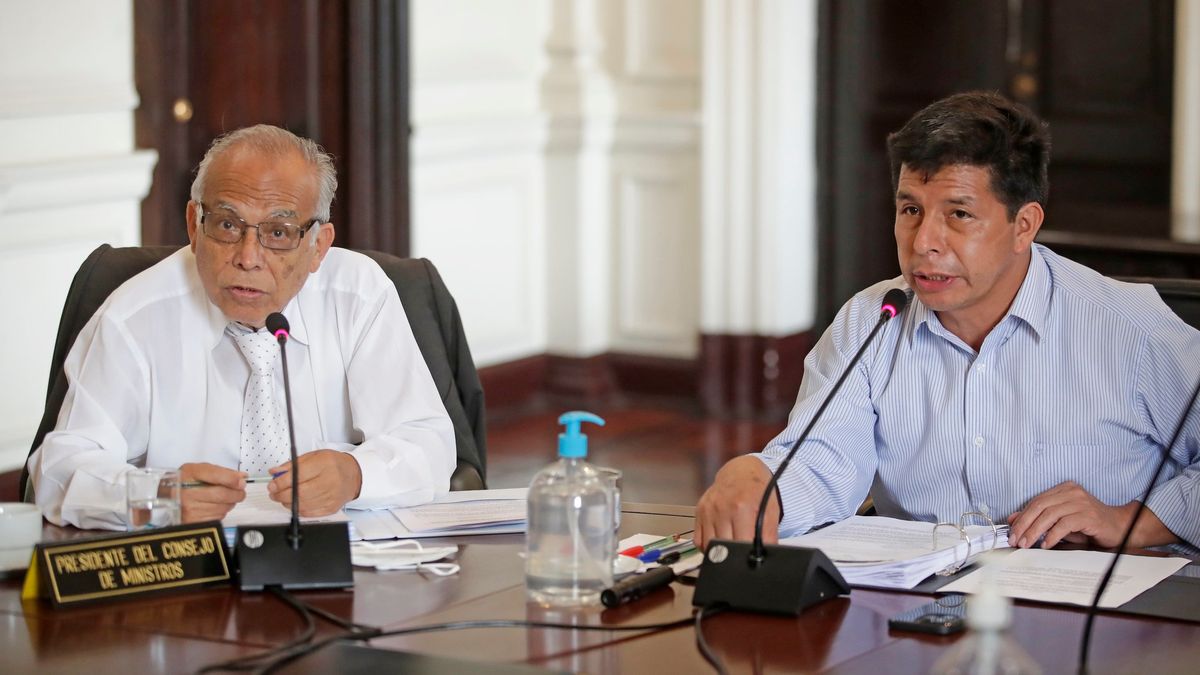Today the opposition party People’s Force (FP) confirmed that he will promote the censorship of the Labor Minister, Betsy Chávez, for authorizing a strike of air traffic operators in the middle of Holy Week, while the legislator Diego Bazán did the same with respect to the Energy Minister, Carlos Palacios, accused of incapacity to occupy office and possible corruption.
But nobody said anything about Torres, whose departure would imply the forced resignation of all the ministers, apart from the fact that President Pedro Castillo could ratify those he deems appropriate.
That silence is explained, for analysts, by the fact that Congress does not want to expose itself to Castillo being empowered to close it, a possibility contemplated by the Constitution of Peru when two cabinets are censored, as happened during the interim government of Martin Vizcarra in 2019.
In this framework, Torres, who had already presented censorship as a “silver bullet” that would favor the Government, assumed a defiant attitude before the plenary, apart from the fact that he began his presentation by proposing a “governance pact” on which He did not offer further details.
The head of the cabinet, a 79-year-old lawyer, was harsh in his responses to the congressmen, who specifically objected to the way in which Pedro Castillo’s executive handled the popular protests in April, which left six dead, two of them in direct actions. from the police.
Torres requested a psychiatric evaluation for a congresswoman who questioned him, proposed an intelligence test for another, challenged one more to debate “alone” and said that he was going to explain as if it were for Coquito, a book with which children learn to read.
When the vice president of Congress, Lady Camones, who was running the session, demanded composure from him, Torres argued that he was the target of insults, referring to the harsh language with which the radical right usually treats leftist government officials.
While the head of the cabinet gave explanations about the handling of public order and Pedro Castillo’s decision to order a daytime curfew in Lima against the protests, many of the parliamentarians who had called for the interpellation left and the room was left half empty. .
The same absenteeism occurred in the interpellations of Chávez, Palacios and the Minister of the Interior, Alfonso Chávarry, for which the local media today spoke of “ghost sessions” that increase the discredit for a Congress which, according to surveys, is rejected by more than 80% of Peruvians.
According to conservative parliamentarian Alejandro Muñante, an eventual censure of Torres would not be of the cabinet as a whole, but of a particular minister, so it would not count as a precedent for an eventual closure of Congress. However, that theory did not get much support among his colleagues.
The political scientist Roger Santa Cruz explained in dialogue with Télam that the matter “does not give rise to interpretations.” “Torres is the representative of government policies, so the person cannot be separated from what he represents,” he said.
According to the Constitution of Peru, the head of the cabinet appoints the holders of each portfolio and the president – who previously appoints that head – ratifies them. Although the obvious thing is that the president himself chooses his ministers, it is considered that each change in the head of the team implies a new administrative stage.
Analysts agree that Torres or whoever succeeded him in the event that he resigned or that Castillo chose to remove him, have the advantage of Congress’s fear of a closure. In this context, the parliamentarians have focused their batteries against ministers in particular, of whom they have already censored two, but without touching who is in charge of the team.
The “interpellation marathon”, questioned by sectors that point out that the congressmen are dedicated to accessory issues, occurred at a time when the Legislative, in which a third is pro-government, another third is a radical opponent and the rest fluctuates according to the issues , is immersed in a series of scandals that further increase his unpopularity.
In recent days, legislators have approved a law against the praised reform of university education, developed a criticized process to elect six new members of the Constitutional Court (TC) and increased their clashes with journalism by prohibiting reporters from attending sessions. .
In those cases there have already been or are being prepared popular mobilizations. The criticism reaches both the radical opposition benches and the ruling party Free Peru (PL) and several of the third parties, whom he accuses of laying down their differences only to legislate in favor of the interests of the political class and their relatives.
The next thing now in that scenario will be the interpellations to the ministers of Labor and Energy, the latter a close associate of the leader of PL, Vladimir Cerronwho the opposition media say has become a kind of power behind the throne.
Parliamentarian Jorge Montoya, a retired admiral who from the extreme right has become one of the greatest symbols of the opposition, announced for his part that he will seek the conditions for a third parliamentary impeachment attempt for Pedro Castillo.
The first two attempts failed due to lack of votes (87 of the 130 parliamentarians are needed) and it does not seem that the scenario has changed, even now that 10 PL congressmen have chosen to become independent in protest because the party has agreed with the right the election of members of the TC.
Source: Ambito
David William is a talented author who has made a name for himself in the world of writing. He is a professional author who writes on a wide range of topics, from general interest to opinion news. David is currently working as a writer at 24 hours worlds where he brings his unique perspective and in-depth research to his articles, making them both informative and engaging.




